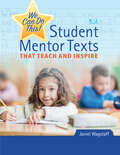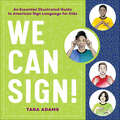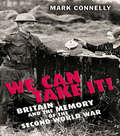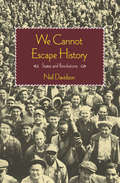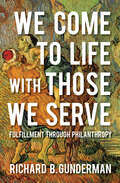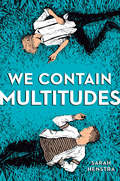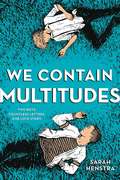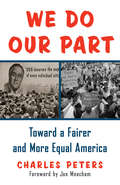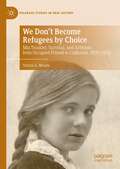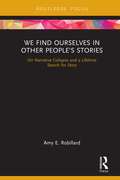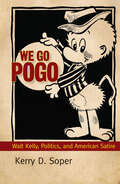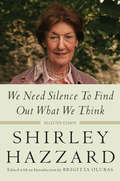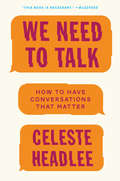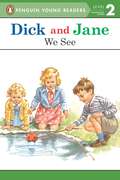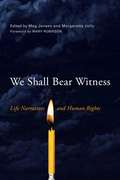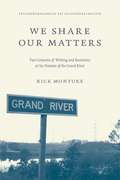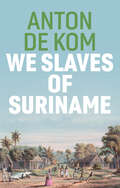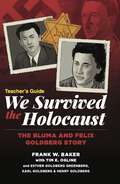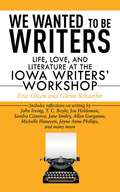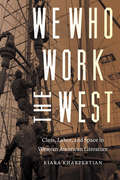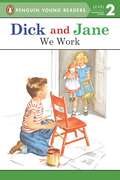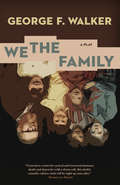- Table View
- List View
We Can Do This!: Student Mentor Texts That Teach and Inspire
by Janiel WagstaffIn We Can Do This! writing expert and Stella Writes author Janiel Wagstaff pairs examples of student writing with writing lessons. Student writing samples are extremely powerful tools for boosting the growth of young writers and the student samples provided in this book serve as mentor texts and the basis for each lesson. The samples are mentors that are doable for students: they highlight skills, strategies, craft moves, and traits within the reach of their intended audience. As teachers and students study the examples, they will think, I can do that! Additionally, samples that reflect the most common errors or trouble spots are included, enabling teachers to explicitly teach to these points.
We Can Sign!: An Essential Illustrated Guide to American Sign Language for Kids
by Tara AdamsEasy signing is in your hands—an illustrated guide for kids ages 8 to 12Discover how simple learning sign language for kids can be! Whether it's for reaching out to a Deaf person, chatting with friends across a crowded room, or just learning an amazing new language, We Can Sign! is an essential guide to getting started with American Sign Language for kids.Bursting with almost 200 fully-illustrated signs, memory tips, and more, this instructional aid for sign language for kids makes mastering ASL easy. Ten chapters take you all the way from sign language basics and conversation phrases to must-have vocab. Get signing today!We Can Sign! An Essential Illustrated Guide to American Sign Language for Kids includes:Up-to-date info—Learn the most modern version of American Sign Language—while also getting fun insight into Deaf culture.Clear illustrations—Start signing fast with detailed drawings that show exactly how each sign should look.182 signs you need—Lessons begin simple and progress to more advanced ideas as you learn words and phrases that are perfect for use in a variety of situations.Get a helping hand with this fully illustrated guide to sign language for kids!
We Can Take It!
by Mark Connelly`We Can Take It!' shows that the British remember the war in a peculiar way, thanks to a mix of particular images and evidence. Our memory has been shaped by material which is completely removed from historical reality. These images (including complete inventions) have combined to make a new history. The vision is mostly cosy and suits the way in which the Britons conceive of themselves: dogged, good humoured, occasionally bumbling, unified and enjoying diversity. In fact Britons load their memory towards the early part of the war (Dunkirk, Blitz, Battle of Britain) rather than when we were successful in the air or against Italy and Germany with invasions. This suits our love of being the underdog, fighting against the odds, and being in a crisis. Conversely, the periods of the war during which Britain was in the ascendant are, perversely, far more hazy in the public memory.
We Cannot Escape History: States and Revolutions
by Neil DavidsonEssays on nationalism, revolution, and other relevant topics from the author of The Origins of Scottish Nationhood. Prize-winning scholar and author Neil Davidson explores classic themes of nation, state, and revolution in this collection of essays. Ranging from the extent to which nationalism can be a component of left-wing politics to the difference between bourgeois and socialist revolutions, the book concludes with an extended discussion of the different meanings history has for conservatives, radicals, and Marxists.
We Come to Life with Those We Serve: Fulfillment through Philanthropy
by Richard B. GundermanA study of how philanthropy can enrich our lives, as shown by examples from both the lives of real-life individuals and fictional characters.What is the most meaningful and rewarding path in life? Many assume we enrich ourselves only by accumulating more wealth, power, and fame, or by finding new and greater forms of pleasure. In reality, we are most enriched not in taking from others but in sharing the best we have to offer through a life of service. The legendary, real-life individuals and the famous literary characters in this inspiring book show us the way: Vincent Van Gogh exemplified service through art, Benjamin Franklin dedicated his life to service of community, and the career of coach John Wooden is apt testimony to the rewards of service through education. Gunderman persuasively argues that, far from draining away our vitality, service at its best actually brings us to life.
We Contain Multitudes
by Sarah HenstraAn exhilarating and emotional LGBTQ story about the growing relationship between two teen boys, told through the letters written to one another. For fans of Aristotle and Dante Discover the Secrets of the Universe and I’ll Give You the Sun. <P><P>Thrown together by a zealous English teacher's classroom-mailbox assignment, notorious scrapper, Adam "Kurl" Kurlansky, and Jonathan Hopkirk, a flamboyant Walt Whitman wannabe, have to write an old-fashioned letter to each other every week. <P><P>Kurl is a senior, an ex high school football player, held back a year, while Jo is a nerdy, out tenth grader with a penchant for vintage clothes and a deep love for poetry. They are an unlikely pair, but with each letter, the two begin to develop a friendship that grows into love. <P><P>But with homophobia, bullying and familial abuse, Jonathan and Kurl must struggle to overcome their conflicts and hold onto their relationship, and each other.
We Contain Multitudes
by Sarah HenstraAristotle and Dante Discover the Secrets of the Universe meets I'll Give You the Sun in an exhilarating and emotional novel about the growing relationship between two teenage boys, told through the letters they write to one another. Jonathan Hopkirk and Adam "Kurl" Kurlansky are partnered in English class, writing letters to one another in a weekly pen pal assignment. With each letter, the two begin to develop a friendship that eventually grows into love. But with homophobia, bullying, and devastating family secrets, Jonathan and Kurl struggle to overcome their conflicts and hold onto their relationship...and each other.This rare and special novel celebrates love and life with engaging characters and stunning language, making it perfect for fans of Jandy Nelson, Nina LaCour, and David Levithan.
We Do Our Part: Toward a Fairer and More Equal America
by Jon Meacham Charles PetersThe legendary editor who founded the Washington Monthly and pioneered explanatory journalism trains his keen, principled eye on the changes that have reshaped American politics and civic life beginning with the New Deal. “We Do Our Part” was the slogan of Franklin Delano Roosevelt’s National Recovery Administration—and it captured the can-do spirit that allowed America to survive the Great Depression and win World War II. Although the intervening decades have seen their share of progress as well, in some ways we have regressed as a nation. Over the course of a sixty-year career as a Washington, D.C., journalist, historian, and challenger of conventional wisdom, Charles Peters has witnessed these drastic changes firsthand. This stirring book explains how we can consolidate the gains we have made while recapturing the generous spirit we have lost. In a volume spanning the decades, Peters compares the flood of talented, original thinkers who flowed into the nation’s capital to join FDR’s administration with the tide of self-serving government staffers who left to exploit their opportunities on Wall Street and as lobbyists from the 1970s to today. During the same period, the economic divide between rich and poor grew, as we shifted from a culture of generosity to one of personal aggrandizement. With the wisdom of a prophet, Peters connects these two trends by showing how this money-fueled elitism has diminished our trust in one another and our nation—and changed Washington for the worse. While Peters condemns the crass buckraking that afflicts our capital, and the rampant consumerism that fuels our greed, he refuses to see America’s downward drift as permanent. By reminding us of our vanished civic ideal, We Do Our Part also points the way forward. Peter argues that if we want to revive the ethos of the New Deal era—a time when government attracted the brightest and the most dedicated, and when our laws reflected a spirit of humility and community—we need only demand it of ourselves and our elected officials. With a new administration in Washington, the time is ripe for a reassessment of our national priorities. We Do Our Part offers a vital road map of where we have been and where we are going, drawn from the invaluable perspective of a man who has seen America’s better days and still believes in the promise that lies ahead.
We Don't Become Refugees by Choice: Mia Truskier, Survival, and Activism from Occupied Poland to California, 1920-2014 (Palgrave Studies in Oral History)
by Teresa A. MeadeThis book traces the life of Maria Mia Truskier, who fled the Nazis as a young Polish Jew in early 1940 and once safely resettled in the United States, became an activist for other refugees, earning renown in the Bay Area as “the oldest refugee” of the East Bay Sanctuary Covenant. Mia worked for decades assisting those fleeing from war, violence and hardship, mainly from Central America and Haiti. Based on extensive interviews with Truskier before she passed away, as well as memorabilia from her own lifetime, including coded letters, newspaper clippings, and old photographs, this book results in a complex and multi-layered oral history. As Mia drew on memories of her life in Europe and World War II, she was situating and constructing those memories while re-reading and discovering these artifacts alongside the author of this book, and ultimately relating the ways that she and her family years later sought to make a difference for other refugees, drawing a connection between two major eras of human displacement: the end of World War II and today.
We Find Ourselves in Other People’s Stories: On Narrative Collapse and a Lifetime Search for Story
by Amy E. RobillardWe Find Ourselves in Other People’s Stories: On Narrative Collapse and a Lifetime Search for Story is a collection of five essays that dissolves the boundary between personal writing and academic writing, a longstanding binary construct in the discipline of composition and writing studies, in order to examine the rhetorical effects of narrative collapse on the stories we tell about ourselves and others. Taken together, the essays theorize the relationships between language and violence, between narrative and dementia, between genre and certainty, and between writing and life.
We Go Pogo: Walt Kelly, Politics, and American Satire (Tom Inge Series on Comics Artists)
by Kerry D. SoperWalt Kelly (1913–1973) is one of the most respected and innovative American cartoonists of the twentieth century. His long-running Pogo newspaper strip has been cited by modern comics artists and scholars as one of the best ever. Cartoonists Bill Watterson (Calvin and Hobbes), Jeff Smith (Bone), and Frank Cho (Liberty Meadows) have all cited Kelly as a major influence on their work. Alongside Uncle Scrooge's Carl Barks and Krazy Kat's George Herriman, Kelly is recognized as a genius of “funny animal” comics. We Go Pogo is the first comprehensive study of Kelly's cartoon art and his larger career in the comics business. Author Kerry D. Soper examines all aspects of Kelly's career—from his high school drawings; his work on such animated Disney movies as Dumbo, Pinocchio, and Fantasia; and his 1930s editorial cartoons for Life and the New York Herald Tribune. Soper taps Kelly's extensive personal and professional correspondence and interviews with family members, friends, and cartoonists to create a complex portrait of one of the art form's true geniuses. From Pogo's inception in 1948 until Kelly's death, the artist combined remarkable draftsmanship, slapstick humor, fierce social satire, and inventive dialogue and dialects. He used the adventures of his animals—all denizens of the Okefenokee Swamp—as a means to comment on American and international politics and cultural mores. The strip lampooned Senator Joseph McCarthy during the height of McCarthyism, the John Birch Society during the 1960s, Fidel Castro during the Bay of Pigs fiasco, and many others.
We Need Silence to Find Out What We Think: Selected Essays
by Shirley Hazzard Brigitta OlubasThese nonfiction works span from the 1960s to the 2000s and were produced by one of the great fiction writers of the period. They add critical depth to Shirley Hazzard's creative world and encapsulate her extensive and informed thinking on global politics, international relations, the history and fraught present of Western literary culture, and postwar life in Europe and Asia. They also offer greater access to her brilliant craftsmanship and the multiple registers in which her writings operate. Hazzard writes about the manifold failings of the United Nations, where she worked in the early 1950s. She shares her personal experience with the aftermath of the Hiroshima bombings and the nature of life in late-1940s Hong Kong. She presents her thoughts on the decline of the hero as a public figure in Western literature. These works contribute to a keener understanding of postwar letters, thought, and politics, supported by an introduction that situates Hazzard's writing within its historical context and emphasizes her influence on world literature. This collection confirms Hazzard's place within a network of writers, artists, and intellectuals who believe in the ongoing power of literature to console, inspire, and direct human life, despite-or maybe because of-the world's disheartening realities.
We Need Silence to Find Out What We Think: Selected Essays
by Shirley HazzardSpanning the 1960s to the 2000s, these nonfiction writings showcase Shirley Hazzard's extensive thinking on global politics, international relations, the history and fraught present of Western literary culture, and postwar life in Europe and Asia. They add essential clarity to the themes that dominate her award-winning fiction and expand the intellectual registers in which her writings work.Hazzard writes about her employment at the United Nations and the institution's manifold failings. She shares her personal experience with the aftermath of the Hiroshima atomic bombing and the nature of life in late-1940s Hong Kong. She speaks to the decline of the hero as a public figure in Western literature and affirms the ongoing power of fiction to console, inspire, and direct human life, despite—or maybe because of—the world's disheartening realities. Cementing Hazzard's place as one of the twentieth century's sharpest and most versatile thinkers, this collection also encapsulates for readers the critical events defining postwar letters, thought, and politics.
We Need to Talk: How to Have Conversations That Matter
by Celeste Headlee“WE NEED TO TALK.”In this urgent and insightful book, public radio journalist Celeste Headlee shows us how to bridge what divides us--by having real conversationsBASED ON THE TED TALK WITH OVER 10 MILLION VIEWS“We Need to Talk is an important read for a conversationally-challenged, disconnected age. Headlee is a talented, honest storyteller, and her advice has helped me become a better spouse, friend, and mother.” (Jessica Lahey, author of New York Times bestseller The Gift of Failure)Today most of us communicate from behind electronic screens, and studies show that Americans feel less connected and more divided than ever before. The blame for some of this disconnect can be attributed to our political landscape, but the erosion of our conversational skills as a society lies with us as individuals. And the only way forward, says Headlee, is to start talking to each other. In We Need to Talk, she outlines the strategies that have made her a better conversationalist—and offers simple tools that can improve anyone’s communication. For example: BE THERE OR GO ELSEWHERE. Human beings are incapable of multitasking, and this is especially true of tasks that involve language. Think you can type up a few emails while on a business call, or hold a conversation with your child while texting your spouse? Think again.CHECK YOUR BIAS. The belief that your intelligence protects you from erroneous assumptions can end up making you more vulnerable to them. We all have blind spots that affect the way we view others. Check your bias before you judge someone else.HIDE YOUR PHONE. Don’t just put down your phone, put it away. New research suggests that the mere presence of a cell phone can negatively impact the quality of a conversation. Whether you’re struggling to communicate with your kid’s teacher at school, an employee at work, or the people you love the most—Headlee offers smart strategies that can help us all have conversations that matter.
We See (Dick and Jane #Vol. 9)
by Penguin Young ReadersLook, Spot. Look, Puff. Look and see. See Sally and Tim.
We Shall Bear Witness
by Margaretta Jolly Meg JensenPersonal testimonies are the life force of human rights work, and rights claims have brought profound power to the practice of life writing. This volume explores the connections and conversations between human rights and life writing through a dazzling, international collection of essays by survivor-writers, scholars, and human rights advocates. In"We Shall Bear Witness," editors Meg Jensen and Margaretta Jolly assemble moving personal accounts from those who have endured persecution, imprisonment, and torture; meditations on experiences of injustice and protest by creative writers and filmmakers; and innovative research on ways that digital media, commodification, and geopolitics are shaping what is possible to hear and say. The book's primary sections-testimony, recognition, representation, and justice-evoke the key stages in turning experience into a human rights life story and attend to such diverse and varied arts as autobiography, documentary film, report, oral history, blog, and verbatim theater. The result is a groundbreaking book that sensitively examines how life and rights narratives have become so powerfully entwined. Also included is an innovative guide to teaching human rights and life narrative in the classroom. "
We Share Our Matters: Two Centuries of Writing and Resistance at Six Nations of the Grand River
by Rick MontureThe Haudenosaunee, more commonly known as the Iroquois or Six Nations, have been one of the most widely written-about Indigenous groups in the United States and Canada. But seldom have the voices emerging from this community been drawn on in order to understand its enduring intellectual traditions. Rick Monture’s We Share Our Matters offers the first comprehensive portrait of how the Haudenosaunee of the Grand River region have expressed their long struggle for sovereignty in Canada. Drawing from individualsas diverse as Joseph Brant, Pauline Johnson and Robbie Robertson, Monture illuminates a unique Haudenosaunee world view comprised of three distinct features: a spiritual belief about their role and responsibility to the earth; a firm understanding of their sovereign status as a confederacy of independant nations; and their responsibility to maintain those relations for future generations. After more than two centuries of political struggle Haudenosaunee thought has avoided stagnant conservatism and continues to inspire ways to address current social and political realities.
We Slaves of Suriname
by Anton de KomAnton de Kom’s We Slaves of Suriname is a literary masterpiece as well as a fierce indictment of racism and colonialism. In this classic book, published here in English for the first time, the Surinamese writer and resistance leader recounts the history of his homeland, from the first settlements by Europeans in search of gold through the era of the slave trade and the period of Dutch colonial rule, when the old slave mentality persisted, long after slavery had been formally abolished. 159 years after the abolition of slavery in Suriname and 88 years after its initial publication, We Slaves of Suriname has lost none of its brilliance and power.
We Survived the Holocaust Teacher's Guide: The Bluma and Felix Goldberg Story
by Frank W. Bakererasing an entire populationBluma TishgartenFelix Goldberga dangerous history that, if we do not heed the warning signs, could very well be repeated.
We Wanted to Be Writers: Life, Love, and Literature at the Iowa Writers' Workshop
by Glenn Schaeffer Bill Manhire Eric OlsenWe Wanted to be Writers is a rollicking and insightful blend of original interviews, commentary, advice, gossip, anecdotes, analyses, history, and asides with nearly thirty graduates and teachers at the now legendary Iowa Writers' Workshop between 1974 and 1978. Among the talents that emerged in those years-writing, criticizing, drinking, and debating in the classrooms and barrooms of Iowa City-were the younger versions of writers who became John Irving, Jane Smiley, T. C. Boyle, Michelle Huneven, Allan Gurganus, Sandra Cisneros, Jayne Anne Phillips, Jennie Fields, Joy Harjo, Joe Haldeman, and many others. It is chock full of insights and a treasure trove of inspiration for all writers, readers, history lovers, and anyone who ever wanted to be a writer. Jane Smiley on the Iowa writers' workshop: In that period, the teachers tended to be men of a certain age, with the idea that competition was somehow the key-the Norman Mailer period. The story was that if you disagreed with Norman, or gave him a bad review, he'd punch you in the nose. You were supposed to get in fights in restaurants. T. C. Boyle on his short story Drowning: I got $25 for it, which was wonderful . . . You know, getting $25 for the product of your own brain? You could buy a lot of beer in Iowa City back then for that.
We Who Work the West: Class, Labor, and Space in Western American Literature (Postwestern Horizons)
by Kiara KharpertianWe Who Work the West examines literary representations of class, labor, and space in the American West from 1885 to 2012. Moving from María Amparo Ruiz de Burton&’s representations of dispossessed Californio ranchers in the mid-nineteenth century to the urban grid of early twentieth-century San Francisco in Frank Norris&’s McTeague to working and unemployed cowboys in the contemporary novels of Cormac McCarthy and Larry McMurtry, Kiara Kharpertian provides a panoramic look at literary renderings of both individual labor—physical, tangible, and often threatened handwork—and the epochal transformations of central institutions of a modernizing West: the farm, the ranchero, the mine, the rodeo, and the Native American reservation. The West that emerges here is both dynamic and diverse, its on-the-ground organization of work, social class, individual mobility, and collective belonging constantly mutating in direct response to historical change and the demands of the natural environment. The literary West thus becomes more than a locus of mythic nostalgia or consumer fantasy about the American past. It becomes a place where the real work of making that West, as well as the suffering and loss it often entailed, is reimagined.
We Work (Dick and Jane #Vol. 10)
by Penguin Young ReadersOh, Dick. Oh, Jane. See, see. Sally can work.
We the Family
by George F. WalkerWe the Family brings us three plays on family and education: Parents' Night documents a teacher's response to an overbearing father; The Bigger Issue examines teacher-student violence; We the Family follows the ripple effects of a culturally diverse wedding.George F. Walker is one of Canada's most prolific and popular playwrights.
